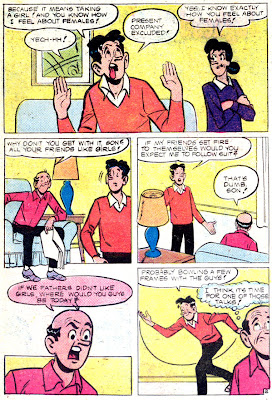That time we looked at a story that didn't have much subtext, and looked at how it pretty much threw out the possibility of Jughead having any sexuality at all. He just loves food! Well let's look at a story that's the polar opposite of Brain Campaign, one that's laden with subtext. So laden with subtext that it's nearly impossible to tell which of it is intentional and which of it isn't. Ladies and gentlemen I give you Rhythm & Blues.
This is a story written by the amazing Frank Doyle and drawn by the titanic Samm Schwartz, so you know you're in good hands from the start. (For those not familiar with Frank Doyle or Samm Schwartz, believe me I'll have more to say about these two masters of the comic arts in the future, but for now know that they're among my top three Archie creators, with Dan DeCarlo filling out the rest of the list.)
From the very first panel this story is telling us it's about sex. Oh, you don't see it? Well, what's the first thing Jughead says? "Dance at the school gym, Pop."
You still don't get it? Man, really? Do I really have to explain the sexual connotations of dancing? Okay, clearly I'm going to need to write a completely separate article to cover a topic that big. For now let's just say that dancing as a sexual metaphor (or sexual ritual) is not just universal across all cultures on the entire planet, it's ancient as dirt. So wake up! When people are talking about dancing, they're usually talking about sex!
Unless, y'know, they're actually talking about dancing. But in this case they're talking about sex!
This second page is the reason I wanted to talk about this story. It's just so laden with subtext. I remember reading this story as a kid, and I thought it was hilarious. Reading it as an adult I think it's hilarious too, but for completely different reasons. The great thing about talking in metaphor as Frank Doyle does here is that it could have so many different deeper meanings.
If you're inclined to think, "Jughead sure is gay!" then this story is probably all the evidence you need. This reads like a parent trying to fix his child's "deviant" sexuality. But if you're gentler in your interpretation it could just be about Jughead's social awkwardness.
I especially like the way Jughead turns the typical parent line, "If my friends set fire to themselves would you expect me to follow suit?" against his father. The cleverness of the character is one of the reasons he's so compelling in this battle of wits.
This next page started with a challenge to Jughead's courage. I love his petulant reaction to it -- it really feels like how a teenager would react. At times Archie comics can struggle a bit with portraying its main characters as actual teenagers (just see any Archie comic cover ever for evidence of this), but Frank Doyle's deft scripts always manage to have snappy, naturalistic dialogue that doesn't feel forced.
On this page we also see how, "Dance" is being used as a sexual metaphor in this story. It's not a blunt metaphor for fucking, instead it's a metaphor for interaction with the opposite sex. I love the way the parents prey on Jughead's insecurities, first on his courage, then on his ability to do something that everyone else can do.
This page is just joyous. I adore Samm Schwartz's art and this sort of thing is why. Look how well defined the panels are here -- but there are no borders. Everything flows beautifully from panel to panel. It's an absolute joy to read. Watch the way Jughead's posture changes from the uncomfortable first panel, to his jiggling leg in the second, to... wait. I'm not here to talk about the art. Sorry, I got a little caught up there.
(Oh, and before anyone mentions Calvin and Hobbes, this Archie story is from 1976)
So Jughead gets caught up in the dance. The slow transition is great, but the twist is coming, and it's obvious, sure, but it's so simple and fun.
This is where we get into dangerous territory with subtext. Obviously if you're too rigid in your reading of subtext this ending is a little disturbing. Having rejected dancing (sex) with other girls he decides it's okay to have a dance (sex) with his mother? Yeaaah, that's not what's going on here.
This is about Jughead's relationship with women. He's comfortable with his mother, but he's not comfortable with other girls who might demand more from him. It's like a gay guy taking his cousin to a dance as a cover.
The part, though, that I like the most about this page are the parental reactions. These guys clearly aren't comfortable with the way Jughead relates to women, and the father's frustration at the end is hilarious, (even if you're inclined to disagree with his motives).
So at the end of this five page story are we any closer to discovering the truth about Jughead's sexuality? Maybe... probably not. If you have strong preconceptions (y'know, if you already think Jughead loves penis, for example) this story probably confirmed them. If like me your attitude towards the issue is more fluid, then the evidence here is a little more shaky.
I think we can only really draw one conclusion here -- Jughead doesn't like to dance with girls.
--Andrew S.
(But he might dance with your mum.)






Nice stuff- I agree with a lot of it. I like that there are different interpretations of Jughead- since Archie rarely follows a distinct canon, you can have your He-Man Woman-Hater (ie. the misogynist, and you can find PLENTY of stories where that's the case), the Asexual, The Homosexual, and the "guy who is straight, but doesn't want to complicate his life with romance". Some are contradictory, but all kind of fit with certain stories.
ReplyDelete